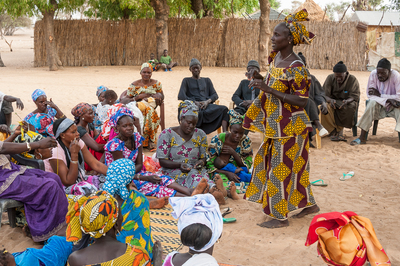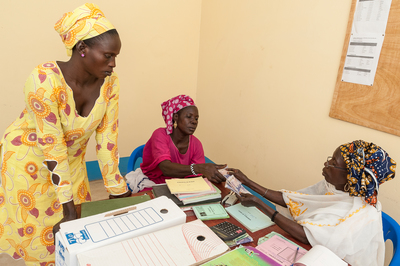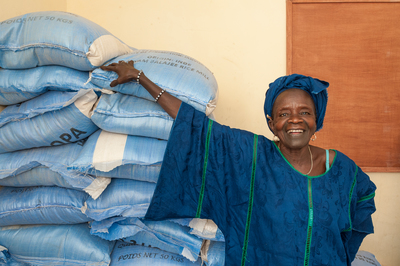Microfinance program as part of the Epicenter Strategy

The Microfinance Program is a training, savings and credit program that promotes the economic empowerment of women in Africa.
- Microfinance Program
- THP Swiss in Burkina Faso
Microfinance Program

The Hunger Project’s Microfinance Program is led by women and primarily serves women. It is a training, credit and savings program through which micro-credit is distributed to groups of women and men and a culture of savings is promoted. The program eventually gains the financial means for economic self-reliance and official government certification to operate as a Rural Bank. Small loans are used primarily for farming and small trade and succeed in increasing household incomes. By running the Microfinance Program, women gain a strong voice in the community.
The core elements of THP’s Microfinance Program are training, credit and savings programs.
Literacy training
In order to participate in the Microfinance Program, potential participants are required to take a literacy test. If they do not pass, literacy trainings are provided at the epicenter for free. Classes are designed to teach literacy while studying terms and topics related to finance, income generation and gender equality. Classes often follow a government curriculum and can consist of 12-18 months of classes and finish with graduation.
Microfinance trainings

THP’s trainings in microfinance empower people through building skills in literacy, budgeting, credit management, leadership, bookkeeping and business plan development. Because THP makes loans to small groups, who hold each other accountable for repaying loans, trainings also include group dynamics. In 2013 30 partners are trained. There will be a partnership with the “Maison de l’entreprise du Burkina” so that more partners can get trained.
Income-generating workshops

Improving the diversification of household income and are tied to THP’s microfinance lending. Income-generating capacity building initiatives include but are not limited to: animal husbandry, animal fattening, petty trade, food processing (jellies, jams, juices, etc.), agriculture, candle making, bread making, basket weaving and fish farming.
Lending and savings

Loans are roughly USD $70-$100 per participant, which is distributed after participants have completed training. Microfinance partners are required to save at least 10% of their loan’s amount. Participants are encouraged and able to save more if they are able. In addition to a required savings deposit, other prerequisites include attending trainings and enrolling their children in school. In 2013 3071 loans will be distributed and 26’010 savings deposits will be gained.
THP plans that four rural banks in Burkina Faso become government-certified in 2013; a crucial step to become self-reliant.
Successes

Since the establishment of the Microfinance Program in 1999 the credit portfolio has grown to about 2.9 million USD in Benin, Burkina Faso, Ethiopia, Ghana, Malawi, Mozambique, Senegal and Uganda. By the end of 2011 45’000 partners had saved a total of 1.6 million USD. But most importantly the banks of 28 epicenters are certified by the government and can operate their own independent rural financial institutions that are led by women.
Expectations of the Partnership
Contribution to an important and sustainable part of self-reliance and overcoming hunger.
Contribution needed:
- Financial Contribution
- Volunteer work in communication
Budget (CHF): 120'000.- in Burkina Faso
Invest in People!
Newsletter (3x annually)
Enter your email below.
Get Connected
Quote
"For me, the Hunger Project means a continuous opportunity to feel and express the solidarity and partnership with the people who live in extreme poverty in Asia, Africa and Latin America. Over the years, huge potential has been released in me and my partners in the affected countries – resulting in sustainable improvements in the quality of life for all."
Dr. iur. Daniel Heini, board member, has been supporting THP for more than 20 years


